Fox News Flash top headlines for September 20
Fox News Flash top headlines are here. Check out what's clicking on Foxnews.com.
The Roman Empire may have left an amazing legacy — but men allegedly "geek out" about the period more often than expected.
A recent TikTok trend prompted women to ask the men in their lives how often they think about the Roman Empire.
The app exploded as husbands, boyfriends, dads and friends revealed what they think about the era and its feats multiple times a week — if not every day.
TikToker Allie Ninfo (@allieninfo) posted a video on Sept. 16 asking her boyfriend how often he thinks about it.
In the video, which has since been viewed nearly three million times, Ninfo’s boyfriend admitted that he thinks about the Roman Empire about three times a week.
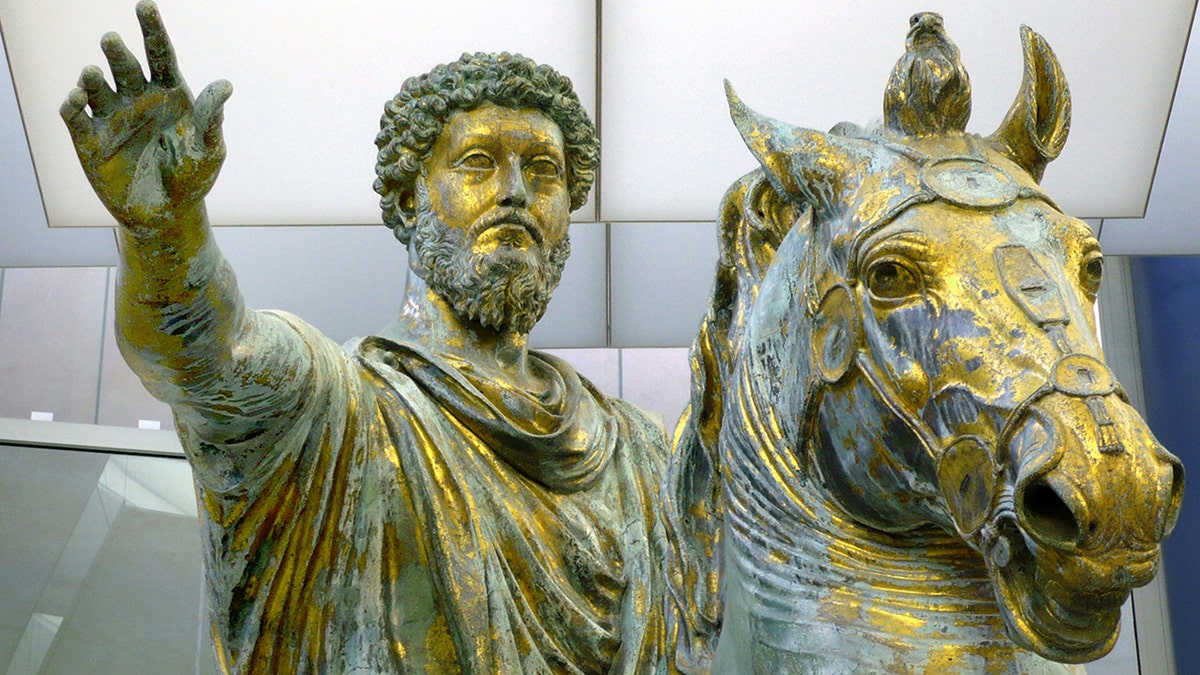
Equestrian statue of Roman Emperor Marcus Aurelius, 161-180, found in the collection of the Musei Capitolini, Rome. (Fine Art Images/Heritage Images/Getty Images)
"A lot of cool s--- happened back then," he said. "I’ve got Marcus Aurelius’ book … I try to watch documentaries on it all the time. It’s awesome."
He added that he’s been thinking about the Roman Empire ever since he was a teenager.
"Every time I fight people, I think about walking into the Coliseum."
Former "Bachelorette" Hannah Brown asked her fiancé, Adam Woolard, the same question in a TikTok video posted on Sept. 15, to which he responded that he thinks about the period "pretty consistently."
"Because I’m big into martial arts," he explained. "Every time I fight people, I think about walking into the Coliseum."

Russell Crowe with a sword in a scene from the film "Gladiator" in 2000. The Colosseum, originally known as the Flavian Amphitheatre, is a giant amphitheater in the center of the city of Rome. (Universal/Getty Images, Art Media/Print Collector/Getty Images)
"Like, if this is a fight to the death and people around are cheering, I have to win," he added. "I think about it constantly."
Woolard went on to reveal what he thinks about the Roman Empire in terms of politics and society.
"Men, I think, to our core, were warriors," he said. "We have to be ready for battle at all times and the Roman Empire is all about battle. It’s common sense."
ROB GRONKOWSKI ANSWERS ROMAN EMPIRE QUESTION AS SOCIAL MEDIA TREND MAKES ITS WAY TO NFL GREAT
Amy Briggs, editor-in-chief of National Geographic History Magazine, noted similar fascinations with the Roman Empire, which still endure thousands of years later.
"There are so many Roman feats that still resonate, I think because there are so many we can still see and interact with — aqueducts, roads, monuments, temples, theaters and stadiums, works of art, literature," she told Fox News Digital.
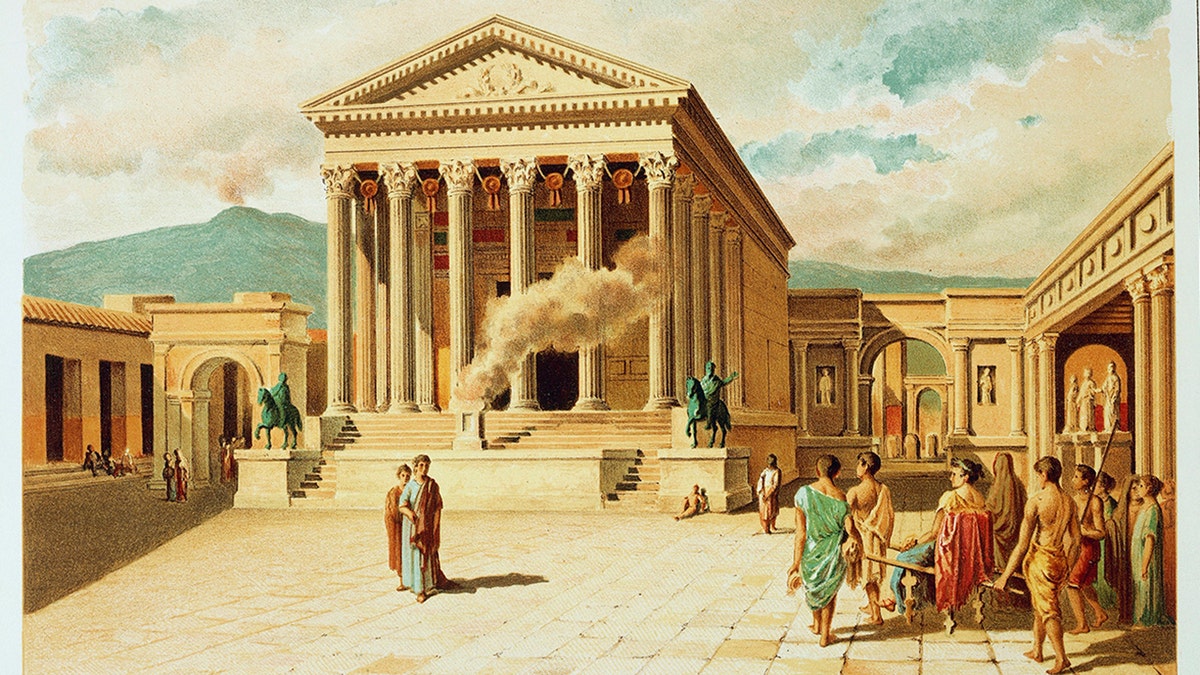
The Temple of Jupiter in Ancient Rome is depicted in this image (DEA/G. DAGLI ORTI/De Agostini via Getty Images)
"This isn't some lost city or vanished people," Briggs went on. "The remnants of this culture are everywhere waiting to be devoured."
Briggs suggested that men in particular are touched by the Roman Empire because of their natural interest in two factors: engineering and the military.
ITALY RETURNS 2,000-YEAR-OLD GRAVE MARKER, EXPORTED ILLEGALLY, TO TURKEY
"Rome has those in spades," she said. "Rome marches across the vast territory, creates an empire and then plants large public works all over it that need to be defended."
The empire was filled with "big projects" such as roads and aqueducts, which not only required an "innovative design," Briggs pointed out, but also a "big, complex labor force."
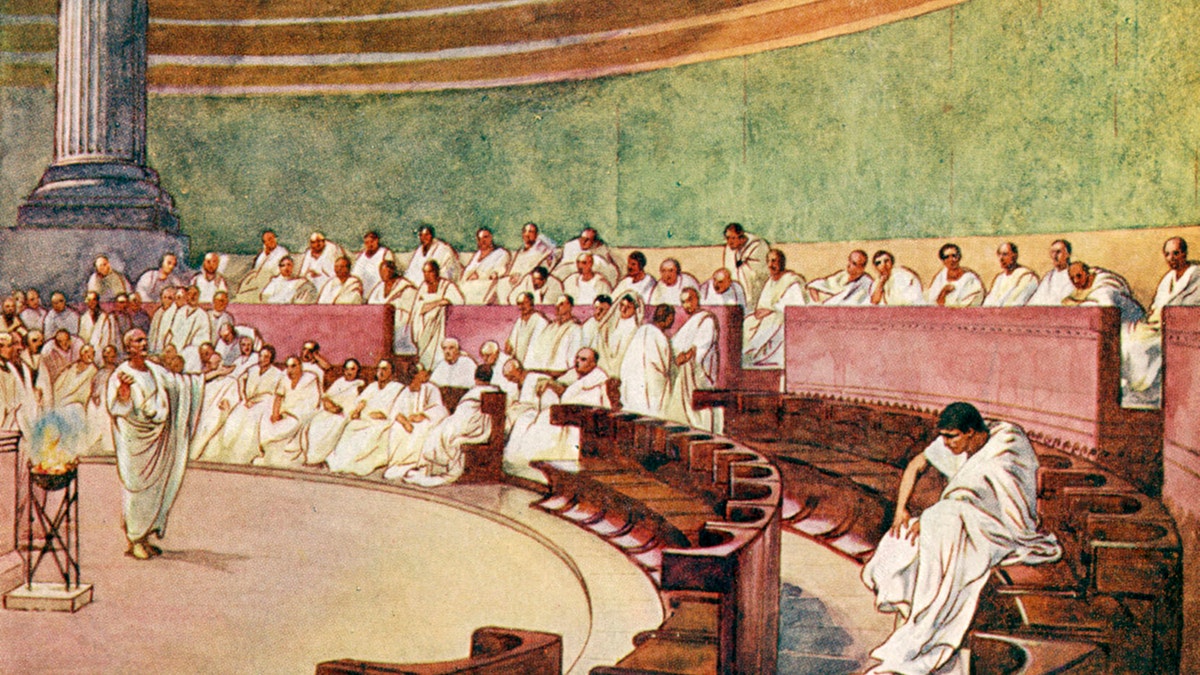
The Senate during the Roman Empire is assembled in a temple with council members wearing white tunics and togas. (J Williamson/Culture Club/Getty Images)
"Contemplating the who, what, when and where of building these things and then replicating that all over the Empire with the existing technology? It's just a really fun thought exercise," she said.
The same thought process goes for military construction, Briggs said.
"This isn't some lost city or vanished people. The remnants of this culture are everywhere waiting to be devoured."
"How do you organize, discipline, arm, clothe and house your forces all over the Empire — sometimes in hostile territories?" she asked.
ROMAN SHRINE UNEARTHED BENEATH FORMER GRAVEYARD OF A CATHEDRAL IN ENGLAND
"If you were plunked down in the middle of the Roman Empire, how would you do it? What would your life be like?"
The history expert assumed that the accessibility of Roman artifacts is what keeps the empire top of mind for some people.
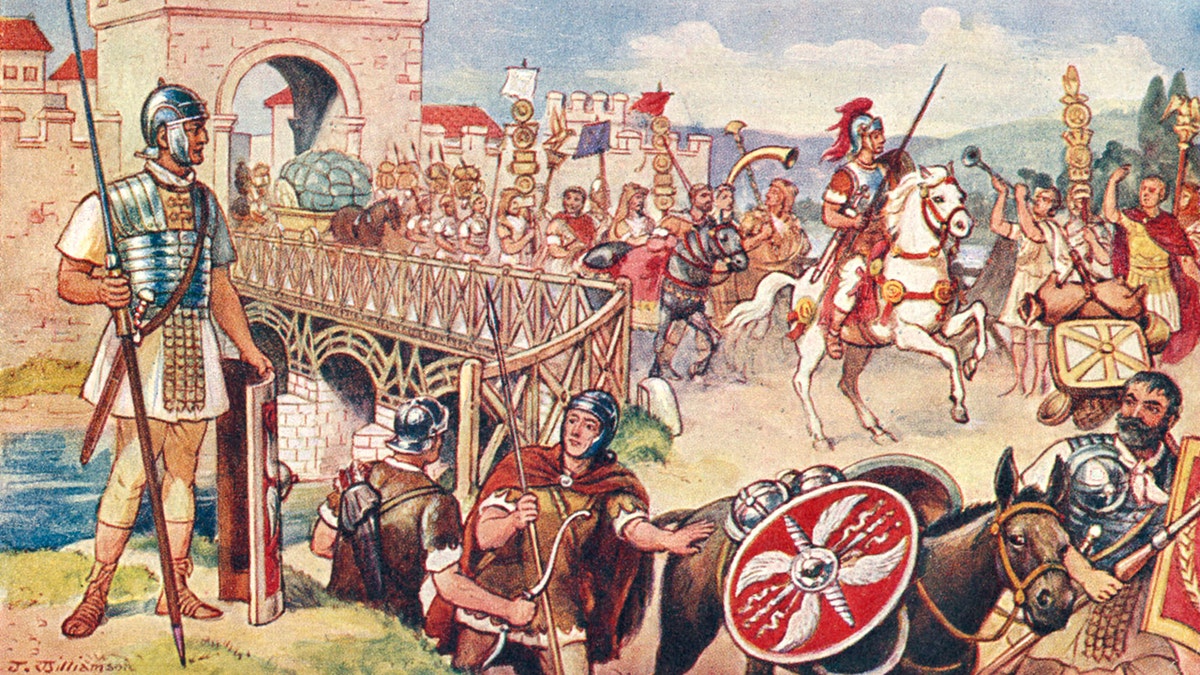
A column of Roman soldiers is shown advancing over a bridge. (J Williamson/ Culture Club/Getty Images)
"There's no shortage of material from that time to consume," she said. "Roman men liked to write, and they did a lot of it."
She added, "And people have been obsessed with Rome for ages — so they've written a lot about Rome, too."
Even the Founding Fathers of the United States were "obsessed" with Rome, according to Briggs.
RESEARCH UNCOVERS SECRET THAT MADE ANCIENT ROMAN CONCRETE SO DURABLE
"They adopted Roman aliases when writing their 18th-century pamphlets and op-eds," she said. "For example, ‘The Federalist Papers’ were published under the pseudonym ‘Publius,’ after a founder of the Roman Republic."
America’s founders also read Edward Gibbon’s "Decline and Fall of the Roman Empire," with Volume I being published in 1776, and "obsessively worried about being a parallel to the licentious Roman Empire," said Briggs.
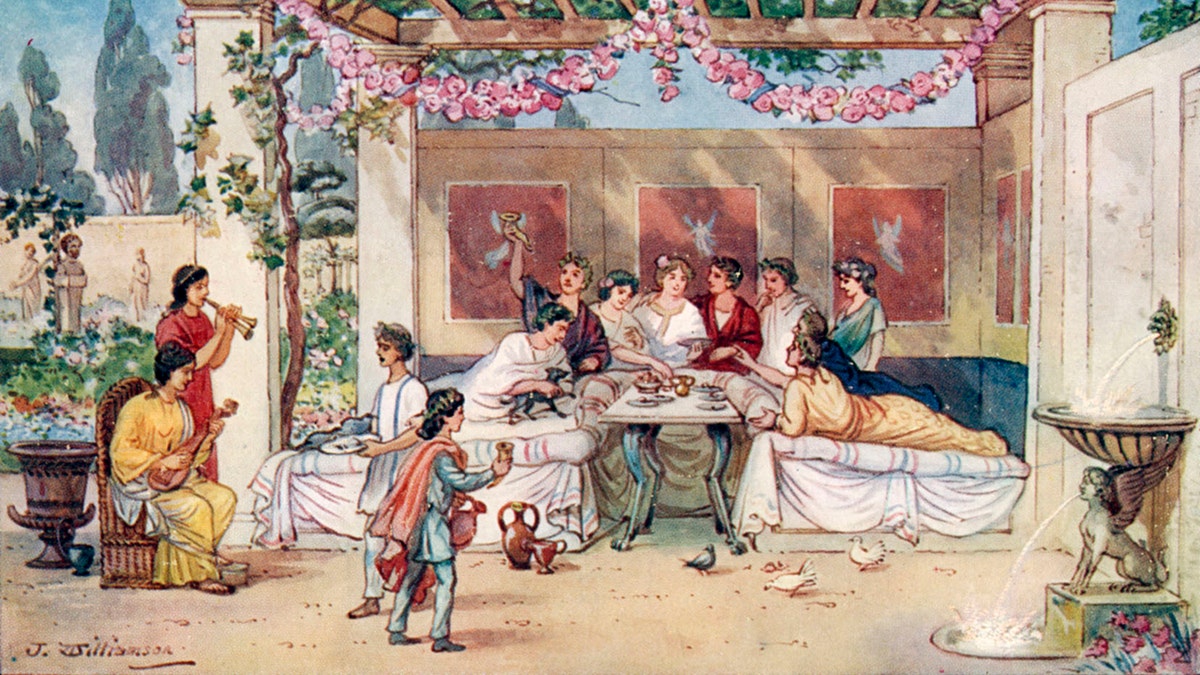
Dinner in the garden during the Roman Empire is pictured, including feasts, fountains, leisure, togas, flowers and double aulo instruments. (J Williamson/Culture Club/Getty Images)
"So, it's a very American thing to think about Rome," she added.
At the "heart of it," Briggs suggested the topic stays popular with both men and women because the Roman Empire is "full of good stories."
CLICK HERE TO SIGN UP FOR OUR LIFESTYLE NEWSLETTER
"TV and movies are full of them: ‘Ben-Hur,' ‘Cleopatra,’ ‘I, Claudius,' ‘Gladiator,' HBO's ‘Rome,'" she said. "Compelling situations, political intrigue, dysfunctional families, and a growing empire as a backdrop."
CLICK HERE TO GET THE FOX NEWS APP
"Don't we all think about this stuff all the time in our fiction? Our history is full of it, too," she said.
"And I think it's all the more compelling because it's not made up. It really happened."
For more from National Geographic on the Roman Empire, visit natgeo.com.
For more Lifestyle articles, visit www.foxnews.com/lifestyle.











































